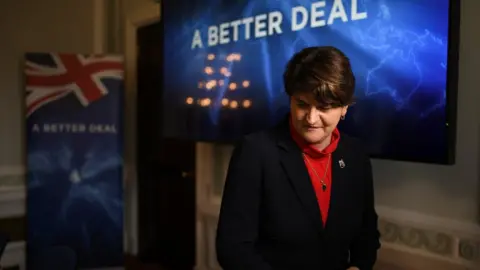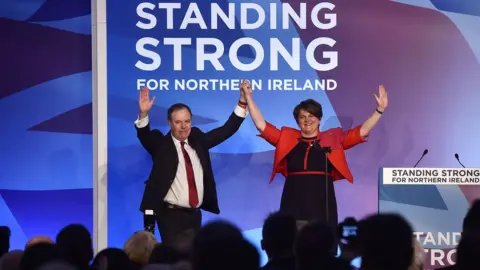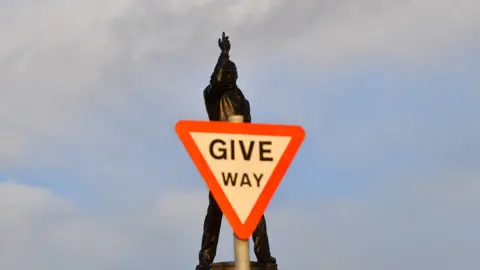Brexit deal: Why does the DUP's opinion matter?
 Getty Images
Getty ImagesOn Thursday, the UK and EU announced news of a new Brexit deal - but Northern Ireland's Democratic Unionist Party (DUP) almost immediately rejected it.
It insists its 10 MPs will not vote for it in Parliament, meaning the government faces a massive challenge in getting enough other MPs on board.
Here's how the new Brexit deal differs from Theresa May's plan, why the DUP won't vote for it - and why that matters.
What was in the original plan for Northern Ireland?
When the first deal was agreed, it included the backstop - the insurance policy to maintain a seamless border between Northern Ireland and the Republic of Ireland after Brexit happens.
The backstop would have seen the whole of the UK retaining a very close relationship with the EU - staying in the customs union - for an indefinite period.
It would also have meant Northern Ireland staying even more closely tied to some rules of the EU single market.
The arrangements would have applied unless and until both the EU and UK agreed a different solution.
But it was rejected on three separate occasions by MPs voting in the Commons.
So how does the new plan differ from the backstop?
It contains several elements, which together, the EU believes can replace the backstop - but crucially, they would operate on a permanent basis.
The whole of the UK would leave the customs union - but EU customs procedures would still apply on goods coming into Northern Ireland from Great Britain in order to avoid checks at the Irish border.
Northern Ireland would also be able to participate in any trade deals the UK strikes with countries in the future.
But the newest proposal - and the one that has divided opinion - relates to the Northern Ireland Assembly getting a say on how the rules on customs arrangements would work.
The revised protocol states Stormont would get a vote four years after the end of the transition period - so in 2024.
A straight - or simple - majority vote by the 90 MLAs would keep the arrangements in place for another four years.
Alternatively, if the arrangements got cross-community consent, passed by most nationalists and most unionists, they would remain in place for eight years.
If the assembly voted to end the arrangements, there would be a two-year notice period, during which the UK and the EU would have to agree ways to protect the peace process and avoid a hard border.
Why does the DUP not like it?
During the Brexit negotiations, the DUP argued that any role for Stormont needed to be on a cross-community basis - in line with how many votes in the Stormont assembly normally take place.
But other political parties had argued that it would have amounted to a unionist veto, which could allow the DUP to stop Northern Ireland from following EU rules.
What is now on the table means the DUP would not have control over the process because pro-EU parties have a narrow majority at Stormont.
 Getty Images
Getty ImagesThe last assembly election in March 2017 also saw unionism lose its overall majority for the first time, coming eight seats short of the 46 required.
Allow X content?
On Thursday, the party argued the consent mechanism in the deal "drove a coach and horses" through the Good Friday Agreement, which established rules for how the Stormont institutions should work.
The DUP also said it could not back the proposals on customs or VAT, and that the deal posed a risk to the integrity of the union.
It had previously conceded to supporting regulatory checks in the Irish Sea - but has refused to budge any further.
Why does the DUP's view matter?
Since 2017, the DUP has held the balance of power at Westminster.
Its 10 votes were crucial for Theresa May to get laws passed in Parliament - and if Boris Johnson is to get his Brexit deal through the Commons, he needs the votes of as many MPs as possible.
He currently does not have a majority and had been hoping the DUP would support the deal in order to make the parliamentary arithmetic smoother.
The government knows that some staunch Brexiteers in the Conservative (and Unionist) Party are likely to listen carefully to the DUP's verdict on the deal, before deciding how to vote.
In short, without the DUP's backing it seems almost impossible for Boris Johnson to get a deal through Parliament, without relying heavily on Labour MPs.
And even some Brexit supporters in their ranks have expressed concerns, with NI-born Labour MP Kate Hoey tweeting that the government had "not thought through" the implications of what it had signed up to.
Allow X content?
What have others in Northern Ireland said about it?
Sinn Féin and the SDLP - the nationalist parties at Stormont - have cautiously welcomed the plan, suggesting that if the alternative is no deal - and a hard border - then it should receive support.
The Ulster Unionist Party criticised it, with the party's Brexit spokesperson Steve Aiken saying that it would be "better to remain in the EU" than back Mr Johnson's plan.
 Getty Images
Getty ImagesThe Alliance Party said the new deal seemed more "clunky and complex" than Theresa May's proposals - and that continuous votes in the assembly meant more uncertainty for businesses in Northern Ireland.
Stormont hasn't functioned for more than 1,000 days - so why propose a role for it in a Brexit deal?
Northern Ireland's government collapsed in January 2017, after a row between the power-sharing parties.
There have been several attempts to get Stormont restored, and the UK and EU say the first vote on Brexit would not happen until 2024, in the hope the assembly will have returned by then.
UK and EU negotiators said it was important to ensure there was "democratic consent" from Northern Ireland on EU arrangements applying in the future.
In the event, however, that Stormont is not sitting by the time a vote is due to take place, the UK has committed to finding an "alternative process".
It has not yet specified how that would work, but it is thought the government would still try to facilitate some kind of vote in the assembly.
